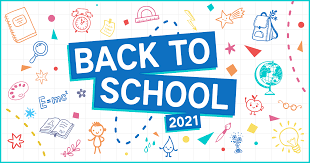Teaching Functional Skills
Just like that, summer is coming to a close and we’re picking out those first day of school outfits and making sure our backpack is ready!
This school year is gearing up to look more normal than it has been in years, while we may not be completely back to “normal” (stay back, Delta!), I for one am very excited to have my kids learning in-person for the entire school day, for the first time in their lives! My oldest entered Kindergarten last year so all she knows is COVID school.
In the few days left before school starts, instead of making sure they know their letters and numbers and sight words, this is an excellent time to work on functional skills. Functional skills are skills that are necessary for daily living and for establishing quality of life. These are the skills that if not completed by an individual themselves, others will have to do. They are skills that are useful and can be immediately applied to the individual’s environment. Given that our kids have been home with us for the last 80 years (or so it feels), we likely have been doing a lot for them, or some school-related functional skills that aren’t required in the home environment may have been lost.
Individuals with autism often struggle more than their peers to learn functional skills that are important to increase their ability to achieve independence. Teaching functional skills can also help to reduce problem behavior. By teaching and individual to make choices to indicate preferences or to ask for help, we can reduce frustration and make sure our learners stay calm and supported.
Functional skills may include communication, choice-making, safety, self-care, leisure and recreation, and vocational skills. Focusing on the functional skills that can help increase our children’s independence during the school day, we are going to focus on safety, self-care, and leisure skills.
Safety:
Now is the time to work on your child’s knowledge of safety skills. They should know your first and last name (not just “mommy” or “daddy”), and your phone number. Additionally, they should know when to ask an adult for help, with everything from a scraped knee to a peer who isn’t being the nicest, they need to know how to advocate for themselves while they are at school. Conflict resolution is another skill that our kids may not have had to practice, at least with people other than their siblings. As we get back to socializing with people, we need to remember how to overcome disagreements and work together to resolve conflict.
Self-care:
Practice putting shoes on the correct feet (using a sharpie to draw arrows in their shoes goes a long way!), unzipping a jacket, zipping a jacket, and even knowing how to pull the arms of their jacket through the right way can help during transitions between the classroom and outside. Practice independent toileting including pulling pants and underwear up and down, and proper hand washing.
Practice opening their lunch box independently and opening any food item you include in lunch. If they need to wait for their teacher to come around and help them open items, it may be several minutes before they get to your child, reducing the amount of time they have to eat their snack or lunch. Pinching and pulling open bags, putting straws in juice boxes, all of these are great skills to practice at home.
Many school districts across the country are mandating mask wearing for all students regardless of vaccination status, so this is also a great time to practice mask wearing again, how to wear the mask properly, and the importance of wearing the mask properly. If you need help with that see our post on the subject.
Leisure skills:
Much to your child’s disappointment, the tablet can’t come to school with them. If your house has been anything like mine over the last year and a half, the tablet has had much more of a prevalence in your day than you’d like to admit. I’m here to tell you it’s ok, we’re all in the same boat, but now is the time to teach your child how to be bored, and how to find something to do. There is a good amount of down time during the school day as transitions are happening, while waiting for activities to be set up, and even free play time. Work on some screen-free imaginative play with your child to work on some of those skills that may have been lost.
As we welcome in the season of pumpkin spice, I for one am looking forward to being able to work for more than 20 minutes of uninterrupted time, and I’m excited for the school year and the growth we are going to see in our kids. There will be challenges as we re-adjust to this new normal, but working on some of these essential functional skills can help ease that transition and help our kids feel happy and empowered as they get back to school!





